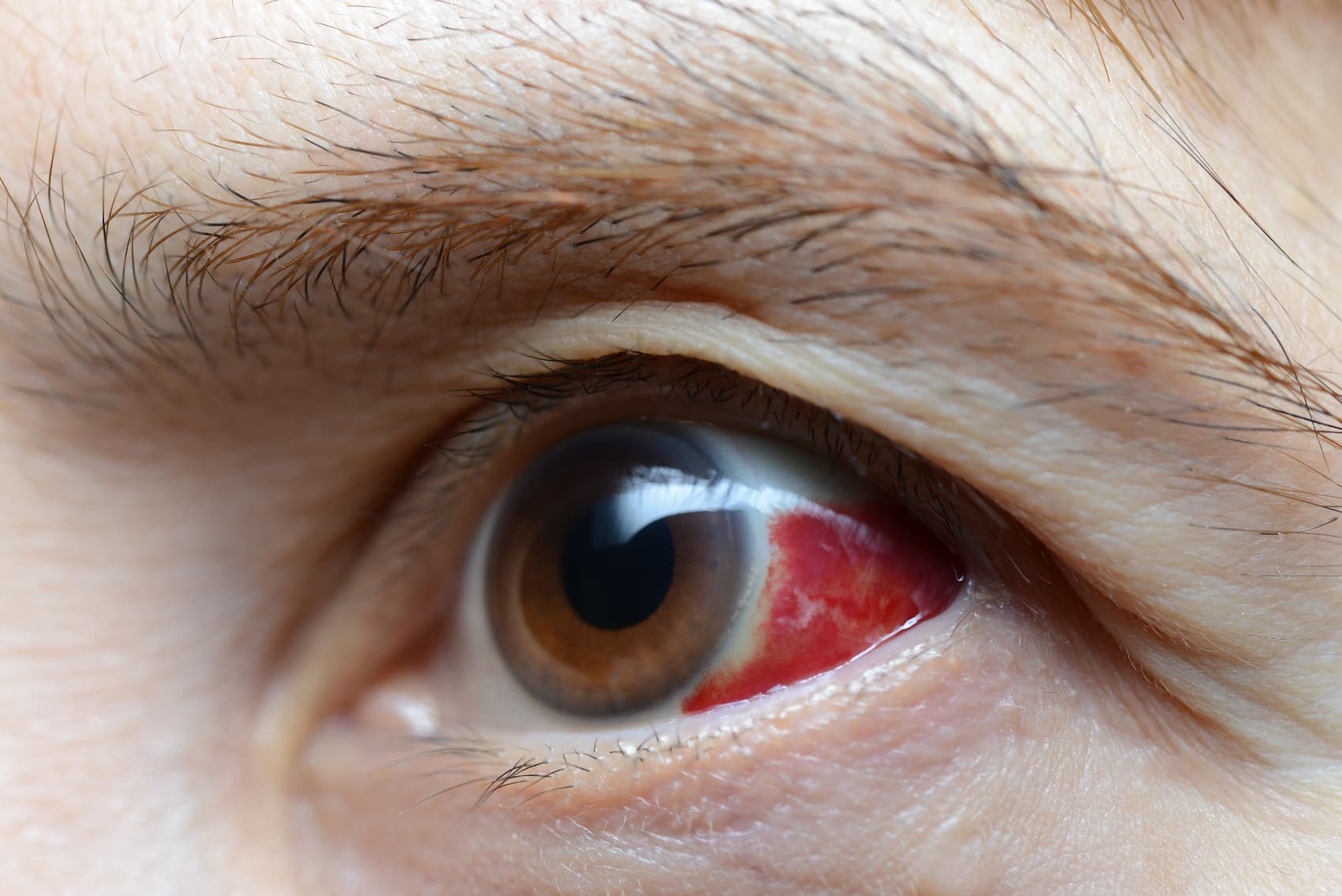Macular degeneration Melbourne
Everything you need to know about macular degeneration and eye injections
Macular degeneration causes distortion and loss of your central vision, and affects your ability to read and recognise faces. Regular eye injections are the gold standard to treat wet macular degeneration.
Eye surgeon Melbourne
Dr Brian Ang in a nutshell
In United Kingdom, Switzerland, New Zealand and India
Macular degeneration symptoms
What is macular degeneration?
Before we answer that question, let’s talk about what the retina and macula are.
The retina is the innermost layer of the eyeball and is responsible for detecting light. Without the retina, you would not be able to see anything.
The macula is the central, most sensitive part of the retina. It has the highest concentration of cone photoreceptor cells and is responsible for detailed central vision. You need the macula to be able to read, recognise faces, and see colours.

Macular degeneration specialist Melbourne
"When you have macular degeneration or AMD, the photoreceptor cells at the macula degenerate and eventually stop working. This means that you will progressively lose your ability to see fine detail and appreciate colours. "
Main symptoms?
The main symptoms include:
- Distortion, where straight lines appear wavy
- Difficulty recognising faces
- Difficulty with reading, despite wearing appropriate spectacles
- Dark or blurred patch in the central vision
Macular degeneration does not cause pain. Here’s an example of how your vision may be affected.


Risk factors?
The main risk factors are:
- Age
- Family history
- Smoking
- Ultraviolet light exposure
Approximately 1.8 million Australians have some signs of macular disease.
Of these, it is estimated that 1.4 million Australians show some evidence of macular degeneration.
Over 15% of those with macular degeneration experience some form of vision impairment.

Difference between wet and dry macular degeneration
Different types of macular degeneration
There are 2 main types of macular degeneration:
Dry macular degeneration
Wet macular degeneration
Wet (or exudative) macular degeneration occurs when abnormal blood vessels grow in the wrong place under the macula. These abnormal blood vessels leak fluid and blood, causing the macula to become swollen.
In both dry and wet macular degeneration, the macula is no longer able to function properly, causing loss of central vision.
Please note that dry or wet macular degeneration has nothing to do with dry eyes or watery eyes.
Diabetic eye disease refers to the spectrum of eye problems that are caused by diabetes. This includes diabetic retinopathy and diabetic macular oedema (DMO).
In diabetic macular oedema, blood vessels at the macula leak fluid and blood, causing the macula to become swollen. DMO is not a form of macular degeneration, even though it shares similar characteristics with wet macular degeneration.
Macular degeneration treatment
Can it be cured?
Unfortunately, macular degeneration cannot be cured or reversed.
There is currently no available treatment for dry macular degeneration.
However wet macular degeneration can be controlled with eye injections of special medicines called anti-VEGF (or vascular endothelial growth factor) medications. These medications are injected into the vitreous cavity at the back of the eyeball.
Anti-VEGF medications work by stopping the growth of abnormal blood vessels and reducing the amount of fluid and blood leakage at the macula. The main anti-VEGF medications used for eye injections in Australia include ranibizumab, aflibercept, and faricimab-svoa.
The main goal of eye injections with anti-VEGF medications is to prevent progressive vision loss from wet macular degeneration (and diabetic macular oedema).
"Most patients are understandably anxious before having eye injections. I always endeavour to make the experience of receiving the injection as comfortable as possible. "
Dr Brian Ang Eye injection specialist Melbourne
Before the actual eye injection, you will receive anaesthetic drops as well as an anaesthetic injection to numb the eye. The eye injection itself takes less than 30 seconds to do and will be all over before you know it. The most you will feel is a slight pricking or pressure sensation.
Most of the time, I perform eye injections in the rooms in Melbourne and Geelong. I only perform eye injections in the hospital theatre setting in specific situations, such as if the injections are combined with cataract surgery.
There is no need to use any specific drops after eye injections. However, you can use over-the-counter lubricant drops if your eye feels irritated after the injection.
 Sometimes the front surface of the eye may become scratched from the injection, causing significant pain that can last up to 48 hours. If the pain does not improve with oral paracetamol, please contact the clinic.
Sometimes the front surface of the eye may become scratched from the injection, causing significant pain that can last up to 48 hours. If the pain does not improve with oral paracetamol, please contact the clinic.Yes, you can, but my preference is to inject the eyes on separate occasions.
Initially, you will need to have eye injections once every month. Depending on the response to treatment, this may be extended to once every 2 to 3 months. For some patients, there is no choice but to continue with eye injections on a monthly basis.
Eye injections with anti-VEGF medications are the gold standard treatment for wet macular degeneration and diabetic macular oedema.

Diabetic macular oedema specialist Melbourne
"Eye injections with steroid medication are also effective at reducing the fluid swelling at the macula for DMO, but not for wet AMD. The steroid medication can be in the form of a dexamethasone implant (Ozurdex) or triamcinolone suspension (Triesence)."
However, eye injections are only one aspect of your treatment. Another equally important treatment focus is managing any risk factors that you may have.
For macular degeneration, this means stopping any smoking habits and protecting your macula from ultraviolet light exposure. For diabetic macular oedema, this also means giving up smoking, as well as maintaining the best possible control of your diabetes.
Stop smoking
Smoking is the most important modifiable risk factor for macular degeneration. Smoking can worsen macular degeneration damage and can make you less likely to respond successfully to the other treatments. The single most impactful action you can take for the health of your macula is actually to stop smoking.
Shield your eyes and wear 100% UV protection sunglasses
Ultraviolet light, specifically ultraviolet A (wavelength 320 – 400 nm), is harmful to the eye and macula. You should wear sunglasses that provide 100% UV protection including for UV radiation up to 400 nm. Harmful UV light is also present on overcast and hazy days, so always wear your sunglasses when outside.
Please note that the UV protective coating on the lenses of your sunglasses is colourless. The darkness of your sunglasses, therefore, does not determine the level of UV protection. The best way to check is to confirm this with your eye care professional.
Monitor your eyes regularly
Once you reach the age of 65, you should have your eyes checked by your eye care professional at least once every year.
You should also monitor your own vision at least once a week using the Amsler grid. If you notice any distortion or abnormality when testing with the Amsler grid, please organise an appointment without delay. Earlier treatment with anti-VEGF injections means better outcomes for your vision.
The Age-Related Eye Diseases Study 2 (AREDS 2) found the following combination of nutrients to be beneficial: vitamin C, vitamin E, zinc, copper, lutein and zeaxanthin. The AREDS 2 supplement formula helps slow down vision loss if you already have intermediate AMD. However, the supplements do not prevent you from getting macular degeneration (or diabetic eye disease).
Your diet is also very important. Aim for a healthy, balanced diet that has plenty of dark green vegetables (good source of lutein and zeaxanthin), oily fish (good source of Omega-3 fatty acids), and fruits plus nuts (good sources of vitamins and zinc).
Dr Brian Ang has published scientific papers on intravitreal injections, diabetic maculopathy, as well as macular degeneration (as part of the National Eye Health Survey).
